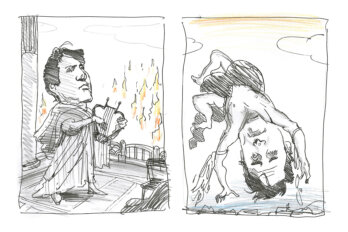Walking the Walk
In “How Connie Walker Got Us Listening” (March/April), Michelle Cyca gives a compelling account of Walker’s journey through serial industry layoffs despite the podcaster’s excellence as a journalist. Walker not only got audiences across North America listening but moved us closer to what it means to contend with the truths of colonialism, genocide, and the ongoing impacts of residential schools. Having started out as a journalist at the CBC before Walker and Duncan McCue, I can attest to how few Indigenous journalists there were at the organization. I can also attest to how the CBC resisted telling Indigenous stories with the investigative depth and breadth that Walker has shown are not only possible but vital. Not too ironically, when I left the CBC, they asked me if I knew any other Indigenous journalists, and I gave them McCue’s name and number. There are now more Indigenous journalists in the industry than when I was at the CBC, and like Walker, many of them are waiting for a chance to do transformative journalism. Let’s hope news organizations support them and have innovative journalists like Walker to help the next generation blaze new pathways.
Candis Callison
Vancouver, BC / Musqueam, Squamish, and Tsleil-Waututh Territories
Unfair Trade
Marcello Di Cintio’s “Labour in the Shadows” (March/April) investigates the labour abuses endured by those who have come to Canada as temporary foreign workers. This precarity is entirely policy induced, resulting from the combination of repressive migration policies providing no or very precarious legal status and the absence of enforcement of labour law with respect to migrants. Governments need to apply labour law equally to all workers and effectively repress exploitative employers. They also need to provide much less precarious legal status to migrants by expanding work visa programs at all wage levels, abolishing single-employer programs and providing open work visas eventually leading to permanent residence. Repressing employers is politically difficult for authorities. First, employers are often electors and constituted in effective lobbies, whereas migrants in precarity cannot vote and may fear reprisal for protesting. Second, empowering migrant workers in such sectors could lead to unionization and an increase in the price of goods and services, as employers would have to considerably raise wages and provide better labour conditions to attract workers in “regular” labour markets. Forty years of “cheap labour” as a hidden subsidy thus cannot be erased overnight. Governments will need to support those economic sectors through a long and painful transition toward progressively saner labour markets, in which all workers can work in fair and equal labour conditions.
François Crépeau
Montreal, QC
Keeping the Doctors Away
As a British Columbian family physician who burned out, I much appreciated Samia Madwar’s reflections on doctors’ exhaustion in “Family Doctors’ Burnout Is about More than Their Workload” (thewalrus.ca), which encapsulated doctors’ propensity to compartmentalize and minimize our own well-being. However, there is another issue imperative to speak about: workplace violence and the trauma it inflicts. SWITCH BC, an organization that advocates for the well-being of medical professionals, reports staggering statistics about violence against health care workers. And whereas hospitals have security, family-doctor offices do not. Violence ranges from sexual harassment to physical threats. I have personally faced every category of workplace violence, from “light” sexual harassment to physical violence (I am therefore choosing to write this letter under a pseudonym*), and it was a significant factor contributing to my decision to leave medicine.
Cecilia Smith*
Victoria, BC




